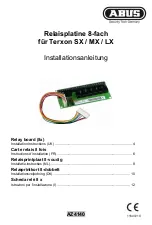
Broyce Control Ltd., Pool Street, Wolverhampton, West Midlands WV2 4HN. England
Tel: +44 (0) 1902 773746 Fax: +44 (0) 1902 420639 Email: [email protected] Web: www.broycecontrol.com
The information provided in this literature is believed to be accurate (subject to change without prior notice); however, use of such information shall be entirely at the user’s own risk
.
P9630-2-A
1
1
1
1
XXXXXX
P
Type: P963
Type: P963
Type: P963
Type: P9630
0
0
0
Inverse
Inverse
Inverse
Inverse Definite Time (
Definite Time (
Definite Time (
Definite Time (IIIIDT)
DT)
DT)
DT) Overcurrent
Overcurrent
Overcurrent
Overcurrent Relay
Relay
Relay
Relay
True R.M.S. measurements
Adjustable Low-set tripping threshold
Adjustable High-set tripping threshold with option to disable
Adjustable Time Multiplier for defining curve tripping characteristic (applicable to Low-set triggering only)
Instantaneous tripping on High-set triggering
Test and Reset button for simulating and clearing of fault condition
Red LED indication of Low-set or High-set triggering and tripping
Green LED indication for Auxiliary power supply presence
Microprocessor based (self checking) with non-volatile memory
Terminals suitable for 2 x 2.5mm
2
wires (complete with protective cover)
•
GENERAL OVERVIEW
The P9630 (from the P9600 series family of IDMT/DT relays) is a microprocessor based relay
designed to monitor and detect Overcurrents in 3-phase applications. Typically the P9630 is
wired in conjunction with external current transformers (1 per phase) of the feeder to be
protected.
The adjustments and indicators are laid out such to help the user during set-up and fault
finding. The adjustment for the Low
Low
Low
Low----set
set
set
set for example has its corresponding red LED positioned
above it so it is clear to which function this LED relates to. The same also applies to the High
High
High
High----
set
set
set
set adjustment and LED. Adjustment and LED operation is explained further on the next page.
The adjustment for IDT
IDT
IDT
IDT (which defines the curve response to tripping) is assigned to the Low
Low
Low
Low----
set
set
set
set triggering only. The High
High
High
High----set
set
set
set does not have any additional adjustments and hence will trip
instantaneously if triggered. If required, the High
High
High
High----set
set
set
set can be set to disabled.
A Test mode is provided (also accessible with the tamperproof transparent cover closed) to
confirm the correct operation of the internal relay. The relay will energise when the “TEST”
“TEST”
“TEST”
“TEST”
button is pressed and de-energise when the “RESET”
“RESET”
“RESET”
“RESET” button is pressed.
•
OPERATION
Example 1.
When an Overcurrent occurs in one of the phases and the level of
current exceeds the “L
“L
“L
“Low
ow
ow
ow----set
set
set
set I>”
I>”
I>”
I>” trip threshold, the corresponding
red LED above the adjustment illuminates. The time out then
commences however the point at which tripping occurs is defined by:
A, the level of current that is above the trip threshold.
B, the Time Multiplier setting.
When tripping finally occurs, the red LED will then flash indicating a
tripped condition.
If the fault current has been removed, pressing the “RESET”
“RESET”
“RESET”
“RESET” button
will return the relay back to normal operation. The red LED will then
extinguish.
Example 2.
If a fault current occurs such that it exceeds the “High
“High
“High
“High----set I
set I
set I
set I>>”
>>”
>>”
>>” trip
threshold the relay will de-energise with no delay. The red LED above
the “High
“High
“High
“High----set I
set I
set I
set I>>”
>>”
>>”
>>” adjustment will flash.
In the event of an Overcurrent condition, the basic sequence of
events is shown below.
Assuming High-set trip is enabled.
•
PRESENTATION
1.
“Time Multiplier”
adjustment* 5.
“Low-set triggered”
red LED indication
2.
“Low-set I>”
trip adjustment* 6.
“High-set triggered”
red LED indication
3.
“High-set I>>”
trip adjustment* 7.
“TEST”
button
4.
“Power supply”
green LED indication 8.
“RESET”
button
* accessible only when the front cover is open
START
OVERCURRENT
occurs
Low-set I>
triggered
Time out
commences
High-set
I>>
triggered?
N
Y
TRIP!
Timeout
complete?
N
Y
Dims:
W x H. 96 x 96mm (front)
W x H. 89.5 x 89.5mm (main body)
L. 107mm





















